How to Grow a Pineapple at Home
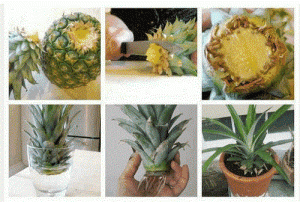

Written and verified by psychologist Valeria Sabater
If you’re curious to learn how to grow a pineapple at home, then keep reading! It’s super easy and fun! All you need is the top of the pineapple, a jar of water, and a flower pot.
Why grow a pineapple at home?
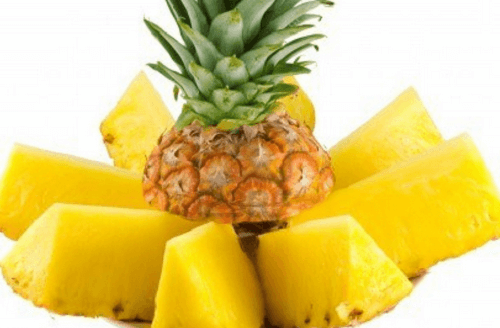
Pineapples are one of the most healthy and beneficial fruits out there. They’re a natural diuretic and help eliminate toxins and prevent constipation thanks to their fiber content.
Read more:
On top of all that, they also help speed up your metabolism and burn fat. Pineapples contains potassium, folic acid, vitamins C, B1, B6, and aid in digestion, along with helping eliminate possible intestinal parasites. They’re fantastic, right?
You can include them incredible pastry recipes and make great juices to help start your day off with energy. So, if you’re wondering how you can grow a pineapple at home instead of having to get yours from the store, keep reading!
How to grow a pineapple at home
The first thing you’ll need to do is pick a good pineapple for your experiment. It needs to be a ripe pineapple: not too soft, with green leaves at the crown. Never pick brown or dark pineapples, only use the healthy looking green ones. If you can, try to get organic pineapples that haven’t been sprayed synthetic pesticides or other chemicals.
Check that the thorns also aren’t gray or dark in color and that there are no bugs on it. It should basically look like a good, mouth-watering fruit.
Step one
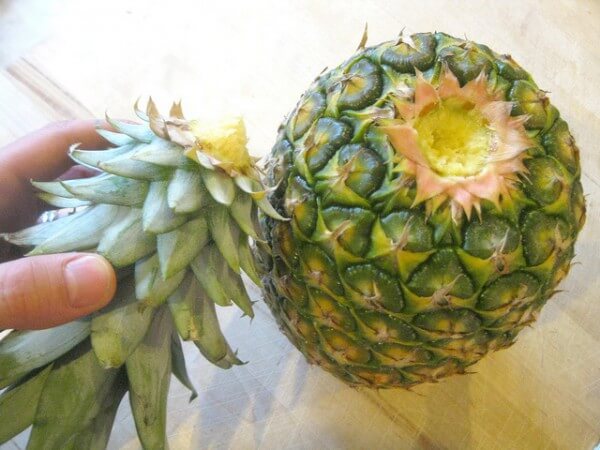
The first thing you do is pop the crown, leaves included, off the top of the pineapple. It’s better to do this by hand than with a knife, because it will ensure more natural roots.
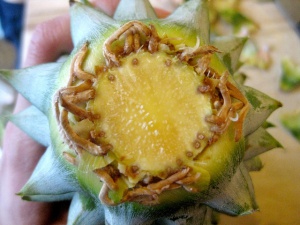
Great, now the next thing you’ll do is take off the remaining pulp off the crown. This part of the pineapple is the area where the new fruit will grow, so you’ll need to clean it well so the new roots can sprout. You also need to clean this part off. As you can see in the photo above, the small roots are still in the pineapple.
Step two
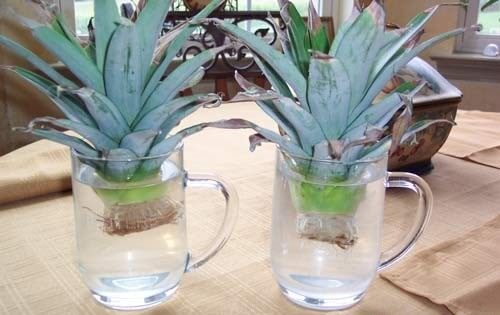
The second step is essential: it involves storing the pineapple crowns. Look for a jar big enough to fit the leaves of the plant too. They’ll need to stay in the jar for at least 3 weeks, while the roots emerge little by little. It’s important to change the water every day and keep the plant in a place with warm temperatures.
You might like:
10 Plants that You can Easily Grow in Your Garden
Step three
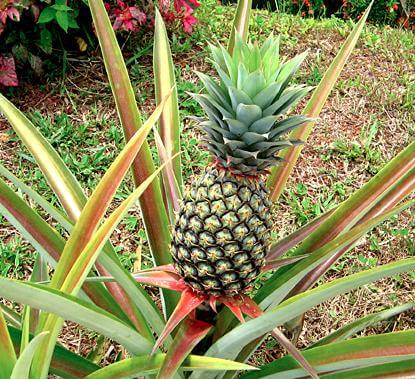
Okay, your plant now has roots, which is the most important part. Now comes a vital step: transferring it to a pot. Make sure the pot is not plastic, always use clay. As a base, place gravel at the bottom to ensure proper drainage.
Use normal potting soil–it doesn’t take a lot of special care. It does need to be in a humid climate, but the soil doesn’t need to be very moist, and the pineapple doesn’t need to be drenched with water all the time. Plant the crown in the soil in a sunny area, but not with excessive sunlight.
You’ll need to have patience. Pineapples take 6-8 weeks to grow strong roots. At 2 months the roots will have the best consistency. You will only need to water this plant twice per week.
Don’t worry if the leaves fall off, it’s normal and they’ll replace themselves naturally. They’ll grow faster in the hottest months and slow down during cooler months. They won’t grow in winter. Although it will take at least one year for the fruit to appear, it’s well worth it!
All cited sources were thoroughly reviewed by our team to ensure their quality, reliability, currency, and validity. The bibliography of this article was considered reliable and of academic or scientific accuracy.
- Farid Hossain, M. (2015). Nutritional Value and Medicinal Benefits of Pineapple. International Journal of Nutrition and Food Sciences. https://doi.org/10.11648/j.ijnfs.20150401.22
- Davey, M. R., Sripaoraya, S., Anthony, P., Lowe, K. C., & Power, J. B. (2007). Pineapple. In Biotechnology in Agriculture and Forestry. https://doi.org/10.1007/978-3-540-49161-3_5
- García, D., & Serrano, H. (2005). La piña, Ananas comosus (L.) Merr. (Bromeliaceae), algo mas que un fruto dulce y jugoso. Frutas.
This text is provided for informational purposes only and does not replace consultation with a professional. If in doubt, consult your specialist.








